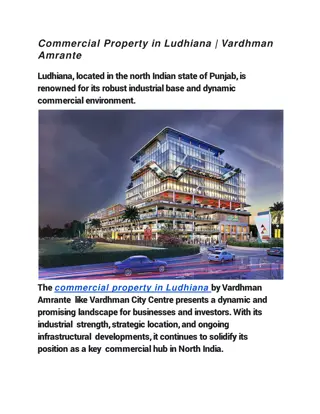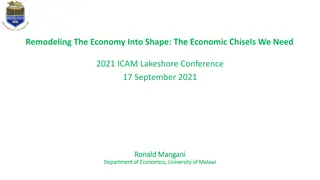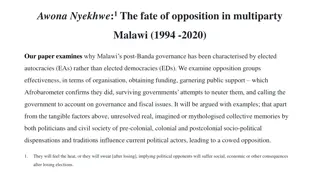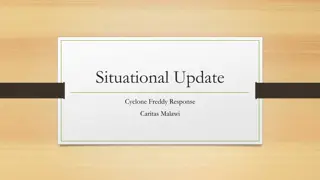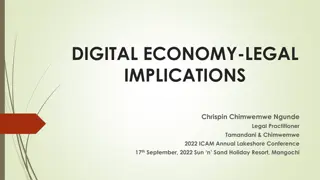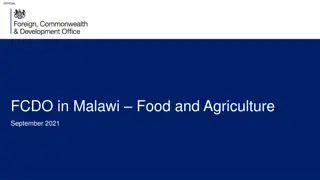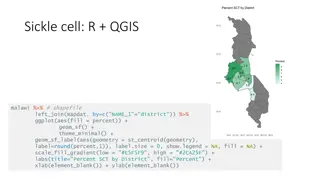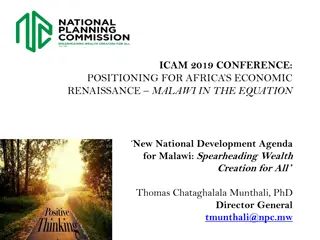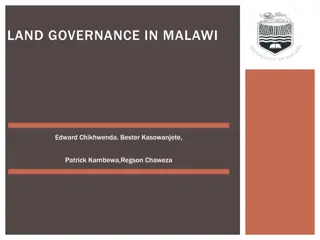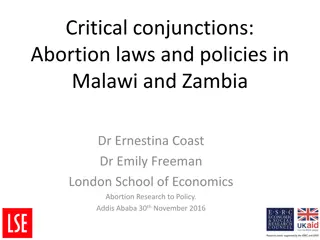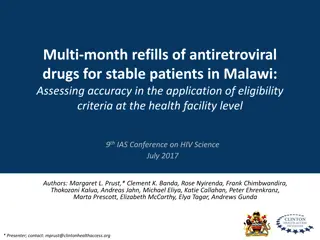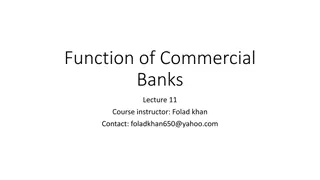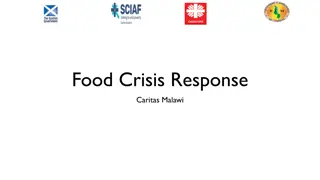Understanding Commercial Matters in Malawi's Business Landscape
Justice Dr. Michael Mtambo discusses the establishment and significance of the Commercial Division within Malawi's High Court system. He explains what constitutes a commercial matter and clarifies that the involvement of a person in business does not automatically make it a commercial case.
Download Presentation

Please find below an Image/Link to download the presentation.
The content on the website is provided AS IS for your information and personal use only. It may not be sold, licensed, or shared on other websites without obtaining consent from the author. Download presentation by click this link. If you encounter any issues during the download, it is possible that the publisher has removed the file from their server.
E N D
Presentation Transcript
THE COMMERCIAL COURT Bottlenecks, Prospects, and Malawi s Business Landscape By Justice Dr. Michael Mtambo, Judge, High Court Commercial Division and Justice of Appeal, COMESA Court of Justice.
Paper presented to the Institute of Chartered Accountants in Malawi (ICAM) Lake Conference 20-22 September 2018 (Mangochi)
Establishment Section 108(1) of the Constitution and section 5 of the Courts Act provide for the establishment and composition of the High Court in general. There is strictly nothing like a Commercial Court. The word is just a term of art. Divisions of the High Court such as the Commercial Division are set up by subsidiary legislation- The Rules made by the Chief Justice under the Courts Act. The Commercial Division was first established in Blantyre. The High Court (Commercial Division) Rules, 2007 were promulgated to govern the procedure in the court. He court came into operation on 4 May 2007 In the year 2009, the Lilongwe Registry was set up initially with one judge.
What is a commercial matter? Under s. 2 of the Courts Act, it is a civil matter of commercial significance arising out of or connected with any relationship of a commercial or business nature, whether contractual or not, including the formation or governance of a business or commercial organisation; the contractual relationship of a business or commercial organisation; liabilities arising from commercial or business transactions; the restructuring or payment of commercial debts; The winding up of companies or bankruptcy of persons;
Meaning of commercial matter contd The enforcement or review of commercial arbitration awards; the enforcement of foreign judgments; the supply or exchange of goods or services; banking, negotiable instruments, international credit and similar financial services; Insurance services; or the operation of stock and foreign exchange market.
Does the fact that the case involves a person doing business mean it is a commercial matter? No. It is the cause of action which matters. Cf Portland Cement Company v Competition and Fair Trading Commission (2008). Employment, family matters and motor vehicle accident liabilities by persons conducting commercial activities are not commercial matters.
The K1 million threshhold Under the 2007 rules, the value of the subject matter was to be K1 million and above for the case to come to the Commercial Division. This means that commercial matters of a value below K1 million could go to the General Division. With a later increase to K2 million for magistrate court jurisdiction, it meant that there was an overlap of jurisdiction between the magistrate courts and the Commercial Division in the K1 to K2 million range. The 2017 rules have removed this threshold, meaning that the Commercial Division, not any other division, can hear commercial matters unless they qualify as small claims which magistrate courts can handle. This will increase the workload and affect fast disposal of cases.
Composition Currently, there are three judges in Blantyre and two in Lilongwe. There are plans to set up a Registry in Mzuzu. Judges may commute from one Registry to serve in another where there is need. When a case is registered, it is assigned to a judge who handles all applications relating to the matter until conclusion of mediation. The case is under the control of the judge, not lawyers who might want to delay and derail cases. If the dispute is not settled at mediation, the file is transferred to another judge for trial. Judge mediation has been adopted in all other divisions of the High Court by virtue of the Courts (High Court) (Civil Procedure) Rules, 2017).
Raison detre The World Bank has been the driving force behind the establishment of Commercial Courts in Africa and other parts of the world. This has been a conditionality for financial assistance. Commercial Courts are seen as one driver for improvement of Doing Business Indicators particularly the one on enforcement of contracts. Drivers in other sectors include how long it takes to get business licences, enter a business, exit it, register land transactions. The idea is to improve the business environment to attract investment and thus development.
Court Related Doing Business Indicators How long it takes to enforce a contract from filing of a case to delivery of judgment in a competent first instance court. Existence of improved and simplified court procedures through new rules such as the High Court (Commercial Division) Rules, 2007 and the Courts (High Court) (Civil Procedure Rules 2017) which replaced the former. The latter rules apply to all divisions of the High Court Use of alternative dispute resolution mechanisms such as mediation and arbitration which unclog the courts. Use of electronic filing. Use of case management systems digitisation and e-litigation.
Ranking Countries ranked from 1 to 168. Malawi poorly ranked. Brunei, Darussalam, Kazakhstan, Kenya, Belarus, Indonesia, Serbia, Georgia, Pakistan, the United Arab Emirates, and Bahrain were the most improved economies and better ranked in 2015/16.
Bottlenecks Lack of infrastructure and adequate funding. Inadequate Commercial divisions closer to the court users. Costly legal representation. High filing fees. 1.5 percent of the value of the subject matter up to a maximum of K150,000. The 2007 rules provided that where the Department of Legal Aid represented an indigent litigant, no filing fees were payable. But this provision was left out in the 2017.
Prospects New building with six court rooms etc. in Blantyre to soon open. Time to delver judgment extended by the 2017 rules from 60 days after conclusion of hearing of a case to 90 days after parties submit submissions after conclusion of the trial. All High Court divisions now have a time-line within which to deliver a judgment.
Malawis Business Landscape Three major developments in the past 2 years on the legal and business landscape: Increased recourse to applications for re-organisation by companies in financial distress, the court s negative rulings on bank penalty interest, and the enactment and coming into force of the Personal Property Security Act.
Company Re-organisation With the enactment of the Insolvency Act 2016 and the Insolvency rules 2017, companies in financial distress have turned to applying for re-organisation in order to have breathing space to try and turn around the business (corporate rescue). On filing an application for reorganisation, there is an automatic moratorium against execution on company assets. New trend has circumvented the rule in NBS Bank v Mumba that a debtor should not keep both the security and the money. Thus a remedy akin to an injunction is now being obtained contrary to the practice previously enshrined in the Commercial Court.
Real Prospects of Success For the court to grant an order of reorganisation, applicant must show real prospects of success in a proposed turn around plan. In Cotton Ginners Ltd v Standard Bank and Others (2017), the Court held that as there was no evidence of new funds being injected and due to depressed prices in the cotton industry, an order for re- organisation could not be granted and the company was wound up so that the banks were at liberty to enforce their securities. The experience of English courts under the Insolvency Act of England 1986 was drawn.
Penalty Interest The rule developed in the English case of Dunlop Pneumatic Tyre Company v Selfridges that only genuine pre-estimates of loss and not penalties are recoverable for breach of contract has been religiously followed in the courts of Malawi. In Gunda v Indebank (2017), the court ordered a refund of over K56 million to a Claimant who had paid it to a bank as a penalty for settling two loans four months late. In National Bank v Lilongwe Gas Co.(2018), it was held that compound interest charged by a bank on overdue accounts, being interest over interest, is the only acceptable loss recoverable by a bank, not additional penalty interest.
Loan Security in the form of Personal Property Introduced by the Personal Property Security Act 2013. Idea to open up loan access to persons who have no real property. Registry kept at Registrar General s office. There is a developed electronic system in use to register securities and their discharge and to search. Enforcement of security can be by self help. Includes dismantling and disabling secured property. In Superior Halaal Co. Ltd. V Standard Bank and Others (2018), the court granted an application by creditors to tag equipment including deep freezers in a shop to warn third parties of their interest.
Conclusion All divisions of the High Court now conduct mandatory mediation by the judge. This was previously only done in the Commercial Division. All divisions of the High Court now have timelines within which to deliver judgment. All divisions now require the judge to be active and not passive to control the pace of litigation and use techniques to streamline the trial process and achieve speed in the disposition of matters. There are new specialist divisions of the High Court such as the Revenue, Criminal, and Civil Divisions. More will follow. The Commercial Court has lost its special prominence as game setter? In view of backwardness in internet penetration, is Malawi ready for courts of the future? But with advent of e-commerce and e-banking, there is hope for e-litigation.








